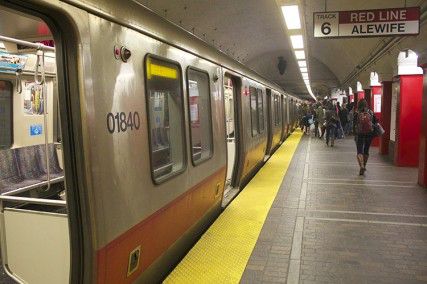
Looking to stimulate economic growth and enhance accessibility to transportation, Mass. Gov. Deval Patrick launched on Tuesday a $1.3-billion program to improve the transportation infrastructure of the Boston area.
Projects include the replacement of Red and Orange Line trains for the Massachusetts Bay Transportation Authority, the repair of the Longfellow Bridge that carries the Red Line and the realignment of Interstate 90 around the Allston-Brighton neighborhoods. They will be managed by the MBTA and Massachusetts Department of Transportation, according to aTuesday press release from the governor’s office.
“The discussion [for the plans] has been ongoing for quite some time,” said spokesman Michael Verseckes, of MassDOT. “But now we’re beginning the process to take it beyond a concept and move it into a stage where there is actually engineering taking place.”
The Longfellow Bridge will be the first completed with the bridge being closed to all motor vehicle traffic on Nov. 2 and Nov. 3, according to an Oct. 21 press release from MassDOT.
Patrick said the collective changes are crucial to the economic development of the city.
“Growth requires investment, and these projects will catalyze growth in greater Boston,” he said in the release. “If we want to expand opportunity in our Commonwealth, this is what government must do and do well.”
The program will also replace the 44-year-old Red Line and the 32-year-old Orange Line cars with a larger and more advanced fleet, but contracts have not yet been awarded for the trains and are scheduled to be phased in by late 2018 and 2019, according to the release.
Michael Manove, economics professor at Boston University, said even with the fleet change, the MBTA still has a long way to go before it is as efficient as it should be.
“Public transportation in Boston is truly pathetic, especially the Green Line,” he said. “Of course, aside from NY, public transport in most U.S. cities is virtually nonexistent. Boston is filled with young people, and many don’t have cars. Good public transportation would make a big difference for them.”
The Massachusetts Turnpike will be the last project to be finished. Plans include the installation of faster, electronic toll systems in several locations, in addition to the Allston-Brighton realignment. The project will be completed in 2020 and cost $260 million, according to the release.
Verseckes said Harvard University owns much of the property in the Allston area proposition, but MassDOT and the MBTA still have rights to operate and maintain transportation and infrastructure through there.
The plan will straighten the turnpike and will require some configurations to exit and entrance ramps and local roads in the Allston area, according to the release.
Several residents said they liked the idea of improving transportation throughout Boston, but had mixed reactions as to how the Commonwealth is addressing transportation deficiencies.
“Replacing the trains is important and it’s definitely something we need to be looking at, but the [MBTA] buses, that’s what we need to fix the most,” said Phillip Foy, 29, resident of Dorchester. “I like that we’re fixing that stuff, but the trains generally work fine and they’re on time. I spend more time waiting for the bus than I do riding it, so we should get more buses, not trains.”
Miguel Blanco, 24, resident of Boston, said this program was one of the first beneficial plans for transportation by the government in years.
“Usually, they [the government] go for showy improvements — shinier signs, new paint jobs, stuff like that, that doesn’t actually fix anything but looks nice,” he said. “This one might really be good news though. The trains and roads might not be the first thing I’d look at, but it’s nice to see actual improvement so things actually work better.”
Ady Basurto, 22, resident of Brighton, said the price tag was her only major concern for the plans.
“Doing anything with transportation seems to be expensive, so I do worry about how much money we’re spending,” she said. “In the end though, we do need it [better infrastructure], so if it makes things better, then it’s a good idea.”
Steven Dufour contributed to the reporting of this article.





















































































































